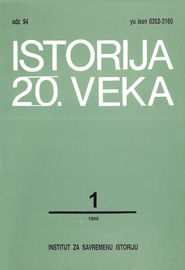ELEMENTI SAMOUPRAVE RUSKIH CIVILNIH IZBEGLICA U KRALJEVINI SHS 1920-1924.
SELF-GOVERNMENT AMONG RUSSIAN CIVIL EMIGRANTS IN THE KINGDOM OF SERBS, CROATS AND SLOVENES 1920-1924
Author(s): Jovan KačakiSubject(s): Governance, Political history, Recent History (1900 till today), Government/Political systems, Interwar Period (1920 - 1939), Migration Studies
Published by: Institut za savremenu istoriju, Beograd
Keywords: interwar period; self-government; Kingdom of Yugoslavia; Russian civil emigrants;
Summary/Abstract: Russian refugees differed from other emigrants who came to the Kingdom of Serbs, Croats and Slovenes (SHS) in terms of both structure (a considerable number of them were army personnel) and in the manner in which they arrived to the host country (the majority came in organized groups). The greatest difference, however, lay in the fact that, in the initial phase of their arrival, Russian refugees in the Kingdom of SHS had at their disposal, besides the full fledged diplomatic representation of the Russian Mission in Belgrade, another Russian government institution, Управление Главноуполномоченнаго по устройству русскихль беженцевль вль Юго-Славии (Office of the High Commissioner for the Organization of Russian Refugees in Yugoslavia). This organization cooperated with the government authorities of the Kingdom of SHS, accepted by them as some sort of internal administrative organ of the Russian refugees. The main tasks of the Office of the High Commissioner were to organize and follow up the general conditions under which the refugees arrived and were received, finding accommodation for the newcomers in the colonies and distributing the financial aid granted by the Kingdom of SHS. The Office had a deciding influence on the internal organization and life of the refugees in colonies throughout the country, and played an important part in the organization and work of arbitration tribunals and courts of honor. The details of Russian refugees’ self-government and their relations with the host country have not been thoroughly examined yet, primarily because the relevant and very rich archival sources are not in Yugoslavia (but in the US) but also because in some cases the exact location of the archives was not known (for instance, the State Committee Archive of the Kingdom of SHS - Yugoslavia for Aid to Russian Refugees was located in Russia). A closer study of these sources will undoubtedly reveal many new facts and aspects of Russian refugees’ self-government in Yugoslavia.
Journal: Istorija 20. veka
- Issue Year: 1998
- Issue No: 1
- Page Range: 93-98
- Page Count: 6
- Language: Serbian

